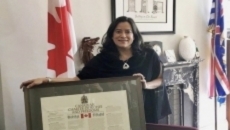More provinces say they are preparing to loosen COVID-19 restrictions in the coming weeks, even as virus-related hospitalizations remain high.
British Columbia's provincial health officer, Dr. Bonnie Henry, said gathering restrictions will begin to slowly be eased later this month.
Even as Alberta reported a record 1,585 people in hospital with the virus, Premier Jason Kenney said he is optimistic the province will be able to relax some public health measures and remove its vaccine passport program by the end of February, providing hospital pressures decline.
Quebec Premier Francois Legault announced yesterday that gyms and spas, which have been closed since Dec. 20, will be able to reopen on Feb. 14.
He also said he is scrapping a plan to tax people who are not vaccinated against COVID-19, saying the plan has proven to be divisive at a time he wants to bring Quebecers together.
After allowing restaurant dining rooms to reopen Monday, Ontario Premier Doug Ford said he will continue with plans to further ease restrictions on Feb. 21 and March 14, despite a warning from the province's scientific advisory panel.
On Tuesday, a panel of scientists that advises the provincial government said that COVID-19 cases, hospitalizations and intensive care admissions will likely rise following this week's reopening, with modelling showing "prolonged'' pressure on the health system.
Prince Edward Island's chief public health officer said she will announce a loosening of restrictions next week, which could include isolation requirements for travellers arriving on the island as well as restrictions on organized gatherings and recreational activities.






